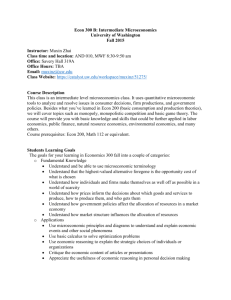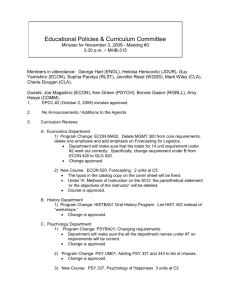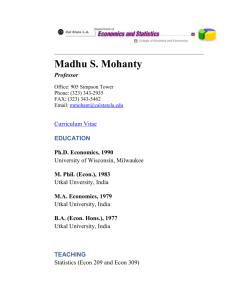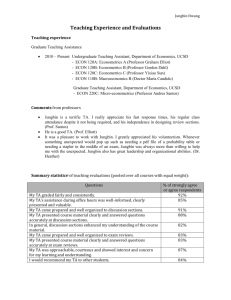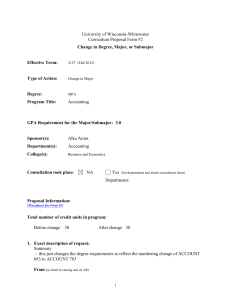The Finance Option - Foster School of Business
advertisement
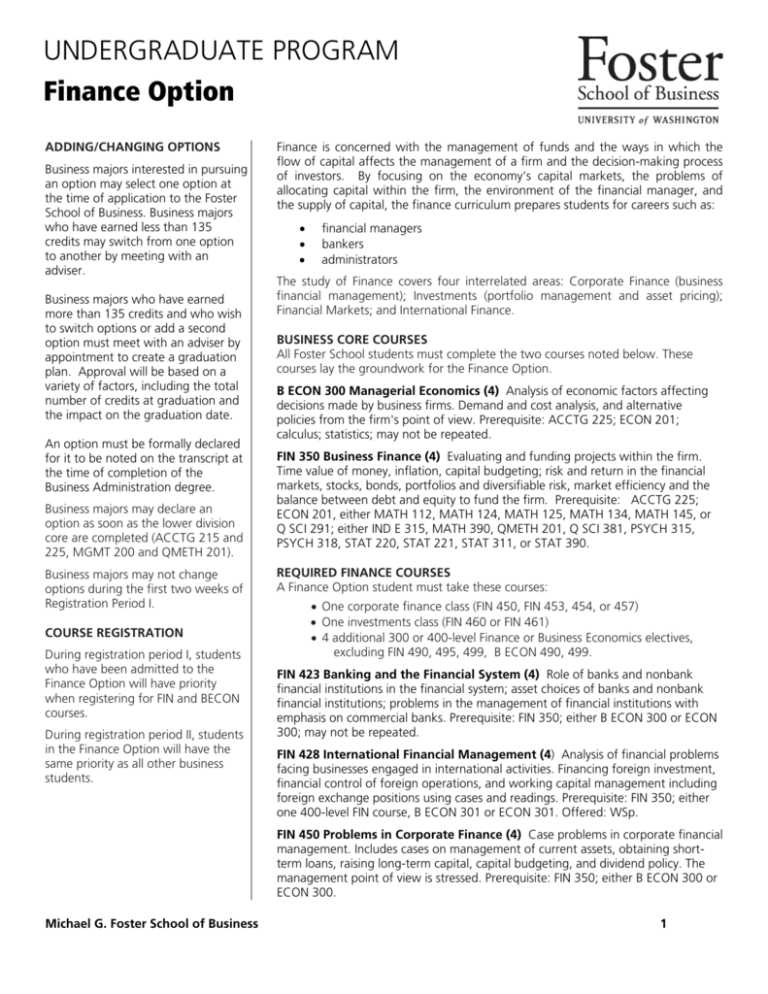
UNDERGRADUATE PROGRAM Finance Option ADDING/CHANGING OPTIONS Business majors interested in pursuing an option may select one option at the time of application to the Foster School of Business. Business majors who have earned less than 135 credits may switch from one option to another by meeting with an adviser. Business majors who have earned more than 135 credits and who wish to switch options or add a second option must meet with an adviser by appointment to create a graduation plan. Approval will be based on a variety of factors, including the total number of credits at graduation and the impact on the graduation date. An option must be formally declared for it to be noted on the transcript at the time of completion of the Business Administration degree. Business majors may declare an option as soon as the lower division core are completed (ACCTG 215 and 225, MGMT 200 and QMETH 201). Business majors may not change options during the first two weeks of Registration Period I. COURSE REGISTRATION During registration period I, students who have been admitted to the Finance Option will have priority when registering for FIN and BECON courses. During registration period II, students in the Finance Option will have the same priority as all other business students. Finance is concerned with the management of funds and the ways in which the flow of capital affects the management of a firm and the decision-making process of investors. By focusing on the economy's capital markets, the problems of allocating capital within the firm, the environment of the financial manager, and the supply of capital, the finance curriculum prepares students for careers such as: • • • financial managers bankers administrators The study of Finance covers four interrelated areas: Corporate Finance (business financial management); Investments (portfolio management and asset pricing); Financial Markets; and International Finance. BUSINESS CORE COURSES All Foster School students must complete the two courses noted below. These courses lay the groundwork for the Finance Option. B ECON 300 Managerial Economics (4) Analysis of economic factors affecting decisions made by business firms. Demand and cost analysis, and alternative policies from the firm's point of view. Prerequisite: ACCTG 225; ECON 201; calculus; statistics; may not be repeated. FIN 350 Business Finance (4) Evaluating and funding projects within the firm. Time value of money, inflation, capital budgeting; risk and return in the financial markets, stocks, bonds, portfolios and diversifiable risk, market efficiency and the balance between debt and equity to fund the firm. Prerequisite: ACCTG 225; ECON 201, either MATH 112, MATH 124, MATH 125, MATH 134, MATH 145, or Q SCI 291; either IND E 315, MATH 390, QMETH 201, Q SCI 381, PSYCH 315, PSYCH 318, STAT 220, STAT 221, STAT 311, or STAT 390. REQUIRED FINANCE COURSES A Finance Option student must take these courses: • One corporate finance class (FIN 450, FIN 453, 454, or 457) • One investments class (FIN 460 or FIN 461) • 4 additional 300 or 400-level Finance or Business Economics electives, excluding FIN 490, 495, 499, B ECON 490, 499. FIN 423 Banking and the Financial System (4) Role of banks and nonbank financial institutions in the financial system; asset choices of banks and nonbank financial institutions; problems in the management of financial institutions with emphasis on commercial banks. Prerequisite: FIN 350; either B ECON 300 or ECON 300; may not be repeated. FIN 428 International Financial Management (4) Analysis of financial problems facing businesses engaged in international activities. Financing foreign investment, financial control of foreign operations, and working capital management including foreign exchange positions using cases and readings. Prerequisite: FIN 350; either one 400-level FIN course, B ECON 301 or ECON 301. Offered: WSp. FIN 450 Problems in Corporate Finance (4) Case problems in corporate financial management. Includes cases on management of current assets, obtaining shortterm loans, raising long-term capital, capital budgeting, and dividend policy. The management point of view is stressed. Prerequisite: FIN 350; either B ECON 300 or ECON 300. Michael G. Foster School of Business 1 THE FINANCE OPTION STUDENT ORGANIZATION Dow Dawgs Finance Association dowdawgs@u.washington.edu students.washington.edu/dowdawgs TRANSCRIPT NOTATION The notation “(Finance)” is put on the academic record (transcript) when the student has earned the Bachelor of Arts in Business Administration degree and has completed the required upper division finance courses with a minimum cumulative GPA of 2.5. ACADEMIC STANDING Students in the Finance Option will be placed on academic probation at the end of any quarter in which the cumulative GPA in required upperdivision finance courses falls below the 2.5 minimum. CAREERS UW Career Center 134 Mary Gates Hall 206.543.0535 http://careers.washington.edu Also, the Occupational Outlook Handbook offers recent information for students interested in researching careers. www.bls.gov/oco CONTACT INFORMATION Foster School of Business University of Washington Box 353200 Seattle WA 98195-3200 Undergraduate Programs Office 202 Dempsey Hall 206.685.3400 bizinfo@u.washington.edu foster.washington.edu/undergrad Department of Finance & Business Economics 474 Paccar Hall 206.543.4773 finance@u.washington.edu foster.washington.edu/departments/fin ance/ Michael G. Foster School of Business FIN 453 Financial Theory and Analysis (4) Business financial strategic planning. Topics include business valuation and financing, performance evaluation, risk analysis, capital budgeting, and inflation and taxes. Emphasizes tools with real-world applications while incorporating modern finance concepts. Prerequisite: FIN 350; either B ECON 300 or ECON 300; may not be repeated. FIN 454 Business Valuation, Investment, and Financing (4) Key issues in financial management using both analytical and case study illustrations. Valuation of public and private companies; cost of capital estimation; investment complications, such as taxes, inflation, risk, project interdependencies, and financing-investment interactions; leasing; mergers; spin-offs and carve-outs. Prerequisite: FIN 350; either B. ECON 300 or ECON 300. FIN 457 Entrepreneurial Finance (4) Explores financial issues that face entrepreneurs, including the stages of financing, business cash flow models, and strategic positioning of the early-stage company. Examines the role of business angels, venture capital funds, institutional investors, strategic alliances, licensing agreements, and exit strategies. Prerequisite: FIN 350; either B ECON 300 or ECON 300. Offered: W. FIN 460 Investments (4) Introduction to the nature, problems, and process of evaluating particular securities and portfolio construction and administration. Special attention is directed to the risk and rate-of-return aspects of particular securities portfolios, and total wealth. Prerequisite: FIN 350; either B ECON 300 or ECON 300; may not be repeated. FIN 461 Financial Futures and Options Markets (4) Introduction to financial futures and options markets. Institutional aspects and social functions of these markets, pricing of options and futures, and risk shifting by hedging. Prerequisite: FIN 350; either B ECON 300 or ECON 300; may not be repeated. FIN 462 Management of Financial Risk (4) Modern tools for managing financial risk. Fixed income securities and interest rate risk, credit risk, foreign currency risk, and insurance. Emphasis on use of futures, forwards swaps, and option contracts. Prerequisite: FIN 350; either B ECON 300 or ECON 300; FIN 461. (Minimum gpa of 3.2 in FIN 461 is required) FIN 466 Alternative Investments: Hedge Funds and Private Equity (4) Examination of the market for alternative investments including the investment strategies employed by hedge funds and private equity firms, the risk-return tradeoffs of those strategies, and the legal and economic environments in which alternative investment firms operate. Prerequisite: FIN 350; either B ECON 300 or ECON 300. B ECON 301 Intermediate Macroeconomics (4) Analysis of economy with attention to the business cycle, output of goods and services (GNP), inflation, unemployment, and government's fiscal and monetary policies. How the economy affects individuals and firms and how to deal effectively with the economic environment. Prerequisite: ECON 201; may not be repeated. B ECON 420 Financial Markets (4) Analysis of the structure and functions of the money and capital markets; the saving-investment process and financial intermediaries; supply and demand for lendable funds and the level and structure of interest rates, role of Federal Reserve and Treasury in money market developments. Prerequisite: either B ECON 300 or ECON 300; may not be repeated. B ECON 426 Competing in the Global Economy (4) Examines the global environment for business and the challenges facing managers in this environment. Explores the implications of the common phrase "think global -- act local" Prerequisite: either B ECON 300 or ECON 300; B ECON 301 or ECON 301 recommended. B ECON 427 International Finance (4) Asset choice and institutional operations in international finance, foreign exchange problems, the impact of international financial problems and operations on business, short- and long-term international financing. Prerequisite: either B ECON 300 or ECON 300; B ECON 301 or ECON 301 recommended. May not be repeated. 2 THE FINANCE OPTION THE FOLLOWING COURSES MAY NOT BE USED TO COMPLETE THE OPTION ACCTG 375 Topics in Financial Reporting (4) Not open for credit to accounting majors or to students who have completed ACCTG 301. (Strongly Recommended) Critical examination of the uses and limitations of general-purpose financial statements that have been prepared in accordance with generally accepted accounting principles. Not open for credit to accounting majors or to students who have completed 301. Prerequisite: 2.0 in ACCTG 225 may not be repeated. B ECON 490 Special Topics in Business Economics (1-6, max. 6) Study and research on topics of current concern to faculty and students. Only offered when allowed by faculty availability and sufficient student interest. Seminar content to be announced in advance of scheduled offerings. B ECON 499 Undergraduate Research (1-6, max. 9) Research in selected areas of business economics. Recommended: either ECON 301 or B ECON 300 and B ECON 301. FIN 459 Venture Investing (4) Analyzes and makes recommendations on investment opportunities through learning the fundamentals of venture investing and performing due diligence on real companies. Explores the venture investing process from the entrepreneur's and the investor's point of view. Students present their recommendations to the Investment Committee of the W Fund. FIN 490 Special Topics in Finance (1-6, max. 6) or B ECON 490 Special Topics in Business Economics (1-6, max. 6) Study and research on topics of current concern to faculty and students. Only offered when allowed by faculty availability and sufficient student interest. Seminar content to be announced in advance of scheduled offerings. FIN 495 Finance Internship (1-4, max. 4) (Strongly Recommended) Internship with a private firm, nonprofit organization or government agency, where work experience involves substantial application of finance concepts learned in classroom. Credit/no credit only. Prerequisite: FIN 350 and permission of instructor. See website for more information: foster.washington.edu/undergrad/internships_index.shtml FIN 499 Undergraduate Research (1-6, max. 9) (Optional) Research in selected areas of business finance, money and banking, or investments, with permission of instructor. Recommend: FIN 350; either B ECON 300 or ECON 300. COMPLEMENTARY ELECTIVES The electives listed below would complement the Finance Option (they do not substitute for any course required for the Finance Option). Non-Business Courses ECON 422 Investment, Capital, & Finance (5) ECON 431 Government & Business (5) ECON 435 Natural Resource Economics (5) ECON 450 Public Finance: Expenditure Policy (5) FOR STUDENTS INTERESTED IN HIGHLY QUANTITATIVE FINANCE CAREERS While completing an undergraduate finance option will provide excellent preparation for entry-level positions in most areas of finance, some of the more quantitative and technical career paths within the financial industry, such as derivatives trading, quantitative research, risk management, financial engineering, and graduate level finance work generally require additional courses in mathematics, economics, and statistics. The following courses are recommended for students interested in these career paths. It is strongly recommended that students consult with a finance faculty member to determine which courses are most appropriate to either their career or graduate school goals. Math Courses MATH 125,126 MATH 135,136 MATH 307,308,309 MATH 334,335,336 Statistics Courses STAT 340,341,342 STAT 394,395,491,492 Computer Programming CSE 142 Economics Courses ECON 422, 423, 424, and 426 Michael G. Foster School of Business 3

